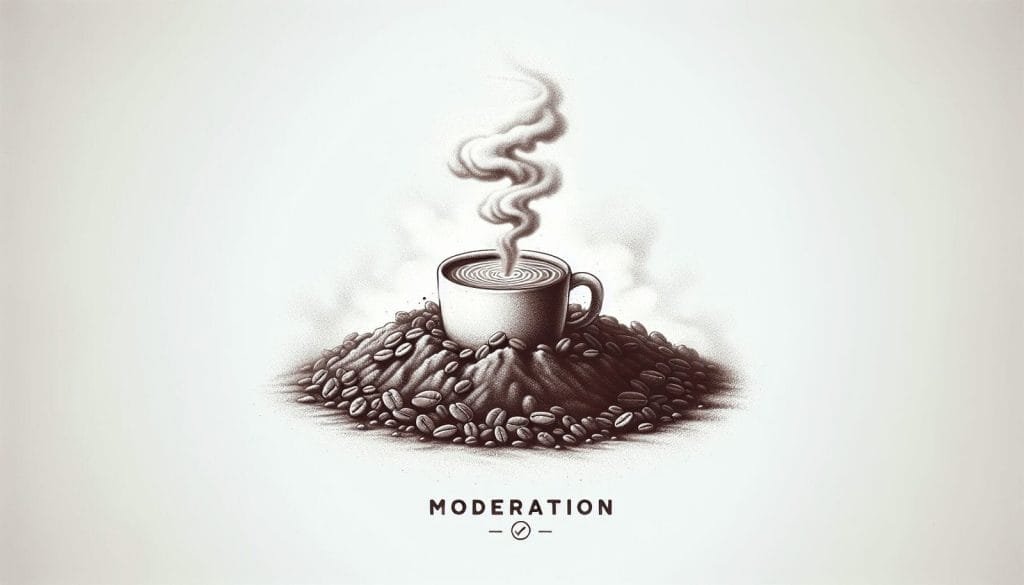Picture this: every morning, as you step into your favorite coffee shop, the familiar aroma of freshly brewed coffee fills the air, awakening your senses and igniting your creativity. The rich, velvety liquid is poured into a porcelain cup, steam circling like a gentle morning mist. With every sip, you feel a surge of energy, a boost to kickstart your day. But amidst the bliss, you find yourself suddenly questioned: is a coffee a day too much? As the debate rages on, we delve into the depths of coffee consumption and uncover the captivating truth behind this beloved beverage.

Understanding Caffeine and Coffee
What is caffeine
Caffeine is a natural stimulant that is found in various plants, including coffee beans. It belongs to a class of compounds known as methylxanthines and is known for its ability to enhance alertness and reduce fatigue. Caffeine is a central nervous system stimulant, meaning that it affects the brain and can increase mental and physical performance.
How caffeine works in the body
When you consume caffeine, it is rapidly absorbed into the bloodstream and reaches peak levels within approximately 30 to 60 minutes. It blocks the action of adenosine, a neurotransmitter that promotes relaxation and drowsiness. By inhibiting adenosine, caffeine promotes wakefulness and increases the release of other neurotransmitters such as dopamine and norepinephrine, which can improve mood and performance. Additionally, caffeine can stimulate the release of adrenaline, leading to increased heart rate and blood pressure.
Types of coffee
Coffee comes in many forms, each with its own unique characteristics. Some popular types of coffee include:
-
Arabica: This is the most common type of coffee and is known for its smooth and delicate flavor. Arabica beans are typically grown at higher altitudes and require specific climate conditions to thrive.
-
Robusta: Robusta coffee beans have a stronger and more bitter taste compared to Arabica beans. They contain higher levels of caffeine and are often used to make espresso or blended with Arabica beans for added depth.
-
Espresso: Espresso is a concentrated form of coffee that is made by forcing hot water through finely ground coffee beans under high pressure. It is characterized by its intense flavor and thick, creamy texture.
-
Cold brew: Cold brew coffee is made by steeping coarsely ground coffee beans in cold water for an extended period. This results in a smooth and less acidic beverage that is often served over ice.
Health Benefits of Coffee
Coffee and heart health
Research suggests that moderate coffee consumption may have a positive impact on heart health. Studies have found that coffee consumption is associated with a reduced risk of developing heart disease, stroke, and heart failure. The antioxidants and anti-inflammatory compounds present in coffee may contribute to these beneficial effects. However, it is important to note that excessive coffee consumption or consuming it with added sugar and creamers can negate these potential benefits.
Coffee and mental health
Coffee has long been associated with improved cognitive function and mental alertness. The caffeine in coffee can enhance focus, attention, and memory, making it a popular choice for those needing a mental boost. Additionally, studies have found that coffee consumption may be linked to a lower risk of developing certain mental health conditions, such as depression and Alzheimer’s disease. However, more research is needed to fully understand these relationships.
Coffee and diabetes
Several studies have found that regular coffee consumption is associated with a reduced risk of developing type 2 diabetes. The exact mechanisms behind this protective effect are not fully understood, but it is believed that the antioxidants and other bioactive compounds in coffee may help improve insulin sensitivity and regulate glucose metabolism. However, it is important to note that adding sweeteners and creams to coffee can negate these potential benefits and contribute to an increased risk of diabetes.
Coffee and liver health
Coffee has been found to have protective effects on the liver. Regular coffee consumption has been associated with a decreased risk of developing liver diseases such as liver cancer, cirrhosis, and fatty liver disease. The antioxidants and other compounds found in coffee may help reduce inflammation and oxidative stress in the liver, promoting overall liver health. However, it is essential to maintain a balanced and healthy lifestyle in conjunction with coffee consumption to reap these potential benefits.
Potential Risks and Side Effects of Coffee
Insomnia and other sleep disturbances
One of the most common side effects of consuming too much coffee is insomnia and disrupted sleep patterns. Caffeine can stay in your system for several hours, and consuming coffee late in the day can make it difficult for you to fall asleep or stay asleep. If you’re sensitive to caffeine, it’s best to avoid consuming coffee close to bedtime to ensure a good night’s rest.
Effects on digestion
Coffee is known to have both positive and negative effects on digestion, depending on the individual. While some people find that coffee stimulates bowel movements and helps with regularity, others may experience an increase in acidity and heartburn. This can be due to the presence of compounds like chlorogenic acids and caffeine, which can stimulate the production of gastric acid. If you experience digestive issues after consuming coffee, it may be helpful to explore alternative brewing methods or opt for decaffeinated options.
Anxiety and restlessness
Caffeine is a stimulant that can increase heart rate and blood pressure, leading to feelings of anxiety and restlessness in some individuals. If you are prone to anxiety or have a sensitivity to caffeine, it may be best to limit your coffee consumption or opt for decaffeinated varieties. It is essential to listen to your body and make choices that promote overall well-being.
Addictive potential of caffeine
Caffeine is a mildly addictive substance, and regular coffee consumption can lead to dependence. When you consume caffeine regularly, your body can develop a tolerance, leading to a reduced effect over time. This may result in the need for higher amounts of caffeine to achieve the desired effects. It is important to be mindful of your coffee consumption and consider taking occasional breaks or exploring alternatives to avoid dependency.
Determining your Coffee Limit
How much caffeine is in your coffee
The caffeine content in coffee can vary depending on the brewing method, the type of coffee beans used, and the serving size. On average, an 8-ounce cup of brewed coffee contains around 95 milligrams of caffeine. However, it is important to note that different coffee beverages, such as espresso or cold brew, can contain higher amounts of caffeine per serving. It is advisable to be aware of the caffeine content in your coffee and adjust your consumption accordingly to meet your individual needs and sensitivity levels.
Factors affecting caffeine sensitivity
Caffeine sensitivity can vary greatly from person to person. Several factors can influence how your body processes and reacts to caffeine, including age, weight, gender, overall health, and individual metabolism. Some individuals may be more sensitive to caffeine and experience stronger effects from smaller amounts, while others may have a higher tolerance and require more significant amounts to experience similar effects. It is important to be aware of your body’s response to caffeine and adjust your coffee consumption accordingly.
How to recognize caffeine overdose
Consuming excessive amounts of caffeine can lead to caffeine overdose, which can have various symptoms such as restlessness, tremors, rapid heartbeat, nausea, and in severe cases, even seizures. It is essential to be mindful of your coffee consumption and monitor your caffeine intake. If you experience any adverse symptoms or suspect caffeine overdose, it is advisable to seek medical attention immediately.

Population-wide Studied Coffee Intake
General consumption trends
Coffee is one of the most widely consumed beverages globally, with millions of people enjoying it daily. Consumption trends may vary across different countries and cultures, but coffee remains a popular and integral part of many people’s routines. It is not uncommon to find coffee shops and cafes bustling with customers seeking their caffeine fix and socializing over a cup of joe.
Geographical differences in coffee consumption
Coffee consumption can vary significantly depending on the region and culture. Some countries, such as Finland, Norway, and Iceland, have the highest per capita coffee consumption rates globally. In contrast, other countries may have lower consumption rates due to cultural or dietary preferences. These geographical differences are influenced by factors such as availability, cultural traditions, and economic factors.
Age-related factors affecting coffee consumption
Age can also play a role in coffee consumption patterns. Younger individuals, such as college students and young professionals, may rely on coffee to stay alert and focused during busy periods of their lives. Older adults, on the other hand, may have more established routines and preferences when it comes to coffee consumption. Additionally, certain age groups may be more cautious about their coffee intake due to health concerns or sensitivity to caffeine.
Impact of Coffee on Daily Performance
Coffee and cognitive function
Coffee has long been associated with enhanced cognitive function and mental performance. The caffeine in coffee can increase alertness, improve focus, and enhance memory retention. Many students, professionals, and individuals in high-pressure environments turn to coffee as a means to improve productivity and maintain mental clarity throughout the day. However, it is important to note that the effects of coffee on cognitive function can vary depending on individual sensitivity and overall health.
Coffee and physical performance
Caffeine is a well-known ergogenic aid, meaning it can enhance physical performance. This is why it is often used by athletes to improve endurance, increase stamina, and reduce fatigue. Caffeine can stimulate the central nervous system and activate the release of adrenaline, leading to improved muscular contractions and increased energy levels. Moderate coffee consumption before a workout or physical activity can help you push harder and achieve better results.
Coffee and mood
Many coffee enthusiasts associate their favorite brew with an elevated mood and a sense of well-being. The caffeine present in coffee can have mood-enhancing effects by increasing dopamine release and stimulating the reward centers in the brain. This can create a feeling of pleasure and happiness upon consuming coffee. However, it is important to note that individual responses may vary, and excessive coffee consumption or sensitivity to caffeine can have the opposite effect.
Alternatives to Coffee
Decaffeinated coffee
For those who enjoy the taste and ritual of coffee but want to limit their caffeine intake, decaffeinated coffee can be a suitable alternative. Decaffeinated coffee is made by removing most of the caffeine from the coffee beans, resulting in a beverage with significantly lower caffeine content. However, it is important to note that decaffeinated coffee is not completely caffeine-free, and the exact amount can vary depending on the brand and brewing method.
Herbal teas
Herbal teas offer a wide range of flavors and health benefits without the caffeine content found in coffee. Options such as chamomile, peppermint, and rooibos can provide a soothing and relaxing experience. Additionally, herbal teas can have their own unique health-promoting properties, such as aiding digestion, reducing inflammation, and promoting better sleep. Exploring the world of herbal teas can open up a new world of flavors and wellness benefits.
Water and other hydrating fluids
Staying hydrated is essential for overall well-being, and while coffee can contribute to your daily fluid intake, relying solely on coffee for hydration may not be sufficient. Water should be the primary source of hydration, and other fluids such as herbal infusions, fruit-infused water, and unsweetened fruit juices can be enjoyed alongside coffee to maintain proper hydration levels. Balancing your fluid intake is crucial to supporting optimal health.
Reducing Coffee Consumption
Healthy ways to cut back on coffee
If you find yourself wanting to reduce your coffee consumption for various reasons, there are several strategies you can adopt:
-
Gradual reduction: Slowly decrease your daily coffee intake by substituting one cup with an alternative beverage or reducing the size of your cups.
-
Coffee alternatives: Explore other bev




